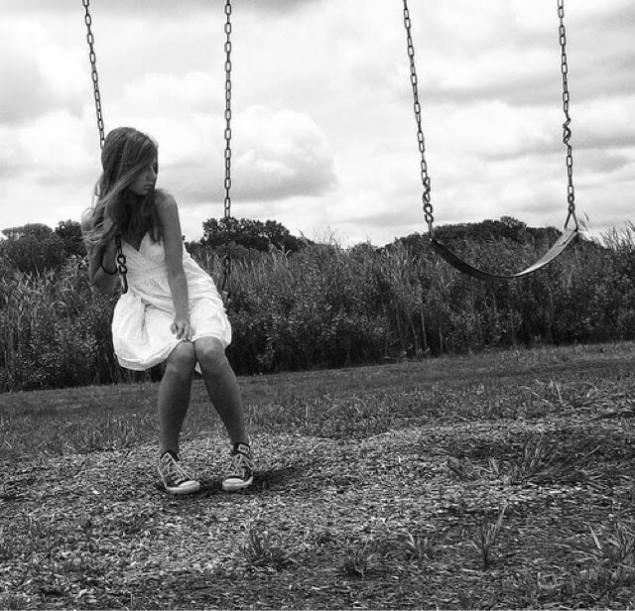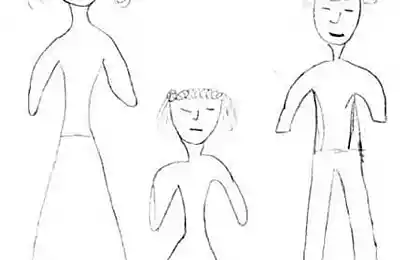467
7 wounds daughters of unloving mothers
When she first learns about who she is in the mirror, who is the face of her mother. She realizes that her love and this feeling – that she is worthy of love and attention that she can see and hear – giving it the strength to grow and become an independent person.
The daughter of an unloving mother – emotionally distant, or fickle, or too critical and cruel – very early gets in life other lessons. She doesn't know what will happen next, what mother will be with her tomorrow – good or bad, she is looking for her love, but is afraid of what the reaction this time will follow, and doesn't know how to earn it. Ambivalent attachment to a mother teaches the girl to the fact that relationships with people are unreliable and they cannot be trusted, avoidant attachment sets up in her soul a terrible conflict between her children's need for love and protection and for the emotional and physical abuse that she receives in response.

Most importantly, the need of the daughter in the mother's love does not disappear even after she realizes that this is impossible. This need continues to live in her heart along with terrible awareness of the fact that the only person who should love her unconditionally, just because she exists, does not. To cope with this feeling, sometimes it takes a whole life.
The daughters who grew up with the realization that they don't like, remain emotional wounds that largely determine their future relations and how they build their lives. The saddest thing is that sometimes they have no idea about the cause and believe that all problems are to blame themselves.
1. The lack of self-confidence
Unloved daughters of unloving mothers don't know that they are worthy of attention, their memory is left feeling that they do love. The girl could grow up getting used day by day only to not hear, ignore or, even worse, it is closely watched and criticized her every move.
Even if she has obvious talents and achievements, they do not give it confidence. Even if it has a mild and sweet temper, her mind continues to sound the voice of his mother, which she perceives as their own, she a bad daughter, ungrateful, does everything out of spite, "who is rose, at others children as children"...
Many as adults say that they have the feeling that they are "deceiving people" and their talents and character are fraught with some kind of flaw.
2. The lack of trust in people
"I always thought it strange why someone wants to be my friend, I started to think, whether this kind of benefit." Such feelings arise from a General feeling of uncertainty of the world which was felt as a girl whose mother brings her to him, then pushes away.
She will continue to require ongoing evidence that the feelings and relationships we can trust that the next day she is not repelled. "You really love me? Why are you silent? You won't leave me?"
But, unfortunately, the girls themselves reproduce in all my relationships only the type of attachment that they had in childhood. And in adulthood they crave emotional storms, UPS and downs, tears and sweet reconciliations. Real love is obsession all-consuming passion, magical power, jealousy and tears. A relaxed relationship of trust they seem to be either unrealistic (they just can't believe it happens) or boring. Simple, not "demonic" man, not likely to attract their attention.

3. Difficulties in defending their own borders
Many of those who grew up in an atmosphere of cold indifference or constant criticism and unpredictability that constantly felt the need for motherly affection, but at the same time I knew I don't know of any way to get it. That caused a good smile today, tomorrow could be rejected with irritation.
And after becoming adults, they still find a way to placate, to appease their partners or friends, to avoid the repetition of maternal coldness at any cost. They can't feel the boundary between "cold and hot", approaching too close, looking for such interpenetrating relationship that the partner himself is forced to retreat under their pressure, on the contrary, fearing to approach the man for fear that will drive them away.
In addition to the difficulties with establishing healthy boundaries with the opposite sex, the daughters of unloving mothers often have problems with friendship. "How do I know that she really my friend?" "She's my friend, it's hard for me to deny it, and in the end about me again, just to wipe your feet."
In a romantic relationship, these girls show avoidant attachment: they avoid intimacy, even looking for a relationship, they are very vulnerable and dependent. "Light a wedge has converged" is their vocabulary. "Throwing sneaky glances, hiding behind a book" about them. Or, as an extreme manifestation of defensive positions – the "right there" on any offer, invitation and request that comes from men. Too great a fear that the relationship will bring them the same pain they experienced in childhood when looking for maternal love and didn't find it.
4. Low self-esteem, failure to recognize its merits
As told in therapy one of these unloved daughters: "as a child I was raised mostly struggling with the disadvantages, the advantages are not told – not to startle. Now, wherever I worked, they tell me that I don't show enough initiative and do not seek promotion."
Many tell, what for them was a real surprise that they were able to achieve something in life. Many delay until the last moment in regard to new acquaintances, find better jobs, to avoid disappointment. Failure in this case would mean a complete rejection, a reminder of the desperation that they experienced in childhood when their mother rejected.
Only in adulthood unloved daughter could believe that she had a normal appearance, and "the three hairs", "not in our breed" and "who will ever take." "I stumbled upon my old photo when I already had children, and saw in her a pretty girl, not skinny and not fat. I like looked at it through the eyes of strangers, did not even realize that it was me, my mother's "boots".
5. Avoidance as a protective reaction and as a life strategy
You know what happens when it's time to look for love? Instead of "I Want to be loved" girl, to feel in childhood, maternal love, somewhere deep down, feels fear: "I don't want to hurt me again." Her world consists of potentially dangerous men, among whom in some unknown way to find her.

6. Excessive sensitivity, "thin skin"
Sometimes someone innocent joke or can cause them tears, because these words are such a light for others, fall very heavy burden in their soul, awaken the whole layer of memories. "When I'm being overly sensitive to someone's words, I specifically remind myself that that's my thing. People can be and didn't want to hurt me". Also so unloved in childhood, daughters are hard to cope with their emotions, because they have not had the experience of unconditional acceptance of their values, which allows you to firmly stand on his feet.
7. Search maternal relationship to relationships with men
We are attached to what is familiar to us, which is part of our childhood, whatever it may fall out. "Only years later I realized that my husband treated me the same as my mother, and I picked it out herself. Even the first words he told me to meet you, was: "You yourself came up with to tie that scarf? Remove". I thought this was very funny and original."
Also interesting: your Mother doesn't like dad praises
Remember the childhood and You determine your personality type in the Enneagram
Why do we have to talk about it now when we have grown up? Not to abandon in despair the cards that we are handed fate. Each they own. Butin order to realize what we do and why. It's very hard to grow up without love, you dropped a hard test, but a lot of people have experienced the same and managed to overcome it.published
Author: Peg Streep
P. S. And remember, just changing your mind — together we change the world! ©
Source: gestaltclub.com/articles/stati/obshchaya-psikhologiya/6894-docheri-ne-vovlechennykh-v-nikh-materej-ranenie-7-ranenij
The daughter of an unloving mother – emotionally distant, or fickle, or too critical and cruel – very early gets in life other lessons. She doesn't know what will happen next, what mother will be with her tomorrow – good or bad, she is looking for her love, but is afraid of what the reaction this time will follow, and doesn't know how to earn it. Ambivalent attachment to a mother teaches the girl to the fact that relationships with people are unreliable and they cannot be trusted, avoidant attachment sets up in her soul a terrible conflict between her children's need for love and protection and for the emotional and physical abuse that she receives in response.

Most importantly, the need of the daughter in the mother's love does not disappear even after she realizes that this is impossible. This need continues to live in her heart along with terrible awareness of the fact that the only person who should love her unconditionally, just because she exists, does not. To cope with this feeling, sometimes it takes a whole life.
The daughters who grew up with the realization that they don't like, remain emotional wounds that largely determine their future relations and how they build their lives. The saddest thing is that sometimes they have no idea about the cause and believe that all problems are to blame themselves.
1. The lack of self-confidence
Unloved daughters of unloving mothers don't know that they are worthy of attention, their memory is left feeling that they do love. The girl could grow up getting used day by day only to not hear, ignore or, even worse, it is closely watched and criticized her every move.
Even if she has obvious talents and achievements, they do not give it confidence. Even if it has a mild and sweet temper, her mind continues to sound the voice of his mother, which she perceives as their own, she a bad daughter, ungrateful, does everything out of spite, "who is rose, at others children as children"...
Many as adults say that they have the feeling that they are "deceiving people" and their talents and character are fraught with some kind of flaw.
2. The lack of trust in people
"I always thought it strange why someone wants to be my friend, I started to think, whether this kind of benefit." Such feelings arise from a General feeling of uncertainty of the world which was felt as a girl whose mother brings her to him, then pushes away.
She will continue to require ongoing evidence that the feelings and relationships we can trust that the next day she is not repelled. "You really love me? Why are you silent? You won't leave me?"
But, unfortunately, the girls themselves reproduce in all my relationships only the type of attachment that they had in childhood. And in adulthood they crave emotional storms, UPS and downs, tears and sweet reconciliations. Real love is obsession all-consuming passion, magical power, jealousy and tears. A relaxed relationship of trust they seem to be either unrealistic (they just can't believe it happens) or boring. Simple, not "demonic" man, not likely to attract their attention.

3. Difficulties in defending their own borders
Many of those who grew up in an atmosphere of cold indifference or constant criticism and unpredictability that constantly felt the need for motherly affection, but at the same time I knew I don't know of any way to get it. That caused a good smile today, tomorrow could be rejected with irritation.
And after becoming adults, they still find a way to placate, to appease their partners or friends, to avoid the repetition of maternal coldness at any cost. They can't feel the boundary between "cold and hot", approaching too close, looking for such interpenetrating relationship that the partner himself is forced to retreat under their pressure, on the contrary, fearing to approach the man for fear that will drive them away.
In addition to the difficulties with establishing healthy boundaries with the opposite sex, the daughters of unloving mothers often have problems with friendship. "How do I know that she really my friend?" "She's my friend, it's hard for me to deny it, and in the end about me again, just to wipe your feet."
In a romantic relationship, these girls show avoidant attachment: they avoid intimacy, even looking for a relationship, they are very vulnerable and dependent. "Light a wedge has converged" is their vocabulary. "Throwing sneaky glances, hiding behind a book" about them. Or, as an extreme manifestation of defensive positions – the "right there" on any offer, invitation and request that comes from men. Too great a fear that the relationship will bring them the same pain they experienced in childhood when looking for maternal love and didn't find it.
4. Low self-esteem, failure to recognize its merits
As told in therapy one of these unloved daughters: "as a child I was raised mostly struggling with the disadvantages, the advantages are not told – not to startle. Now, wherever I worked, they tell me that I don't show enough initiative and do not seek promotion."
Many tell, what for them was a real surprise that they were able to achieve something in life. Many delay until the last moment in regard to new acquaintances, find better jobs, to avoid disappointment. Failure in this case would mean a complete rejection, a reminder of the desperation that they experienced in childhood when their mother rejected.
Only in adulthood unloved daughter could believe that she had a normal appearance, and "the three hairs", "not in our breed" and "who will ever take." "I stumbled upon my old photo when I already had children, and saw in her a pretty girl, not skinny and not fat. I like looked at it through the eyes of strangers, did not even realize that it was me, my mother's "boots".
5. Avoidance as a protective reaction and as a life strategy
You know what happens when it's time to look for love? Instead of "I Want to be loved" girl, to feel in childhood, maternal love, somewhere deep down, feels fear: "I don't want to hurt me again." Her world consists of potentially dangerous men, among whom in some unknown way to find her.

6. Excessive sensitivity, "thin skin"
Sometimes someone innocent joke or can cause them tears, because these words are such a light for others, fall very heavy burden in their soul, awaken the whole layer of memories. "When I'm being overly sensitive to someone's words, I specifically remind myself that that's my thing. People can be and didn't want to hurt me". Also so unloved in childhood, daughters are hard to cope with their emotions, because they have not had the experience of unconditional acceptance of their values, which allows you to firmly stand on his feet.
7. Search maternal relationship to relationships with men
We are attached to what is familiar to us, which is part of our childhood, whatever it may fall out. "Only years later I realized that my husband treated me the same as my mother, and I picked it out herself. Even the first words he told me to meet you, was: "You yourself came up with to tie that scarf? Remove". I thought this was very funny and original."
Also interesting: your Mother doesn't like dad praises
Remember the childhood and You determine your personality type in the Enneagram
Why do we have to talk about it now when we have grown up? Not to abandon in despair the cards that we are handed fate. Each they own. Butin order to realize what we do and why. It's very hard to grow up without love, you dropped a hard test, but a lot of people have experienced the same and managed to overcome it.published
Author: Peg Streep
P. S. And remember, just changing your mind — together we change the world! ©
Source: gestaltclub.com/articles/stati/obshchaya-psikhologiya/6894-docheri-ne-vovlechennykh-v-nikh-materej-ranenie-7-ranenij
Why does the soul hurt?
If you are constantly thinking about what you don'T like, it will definitely be in your life























